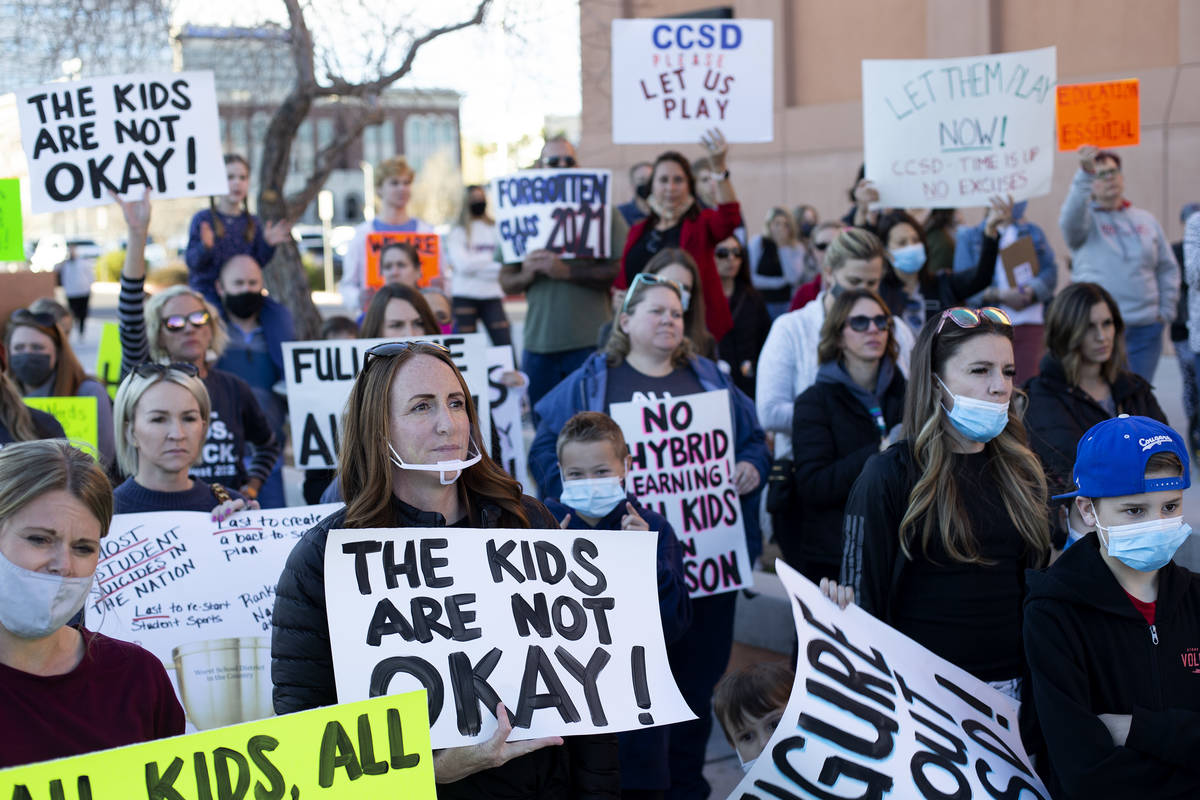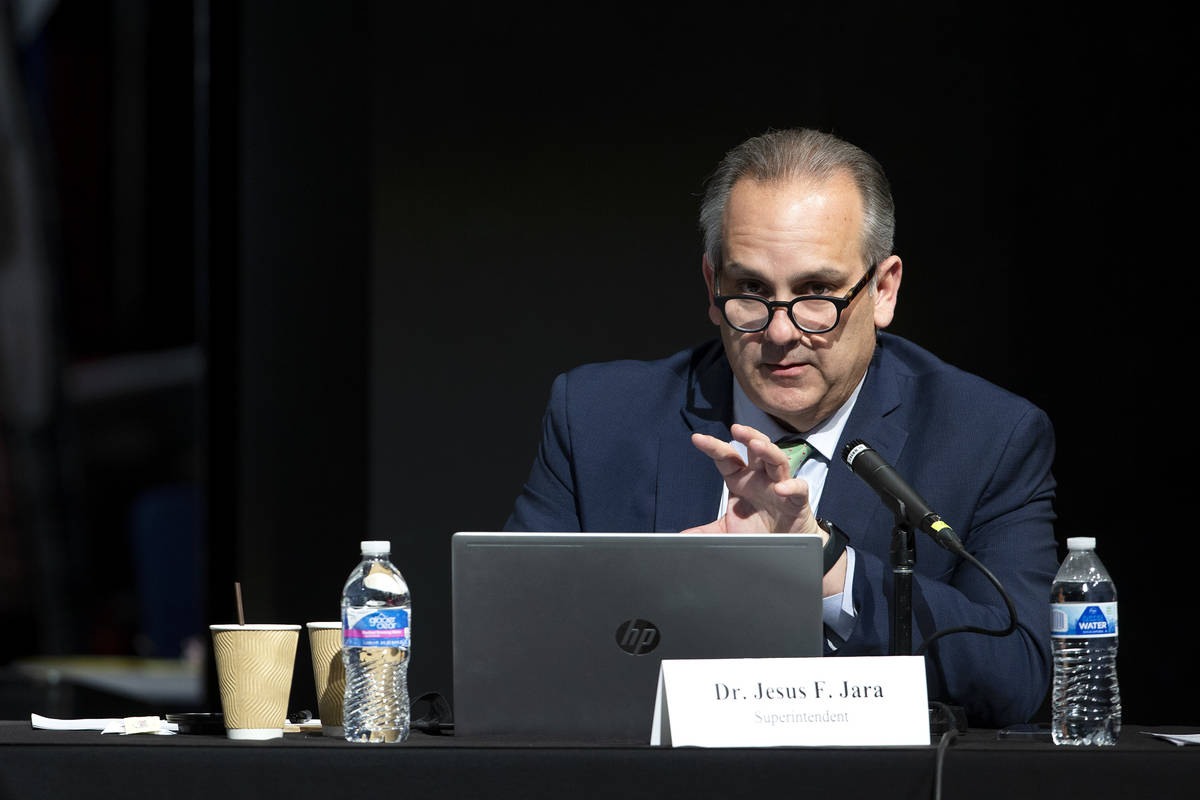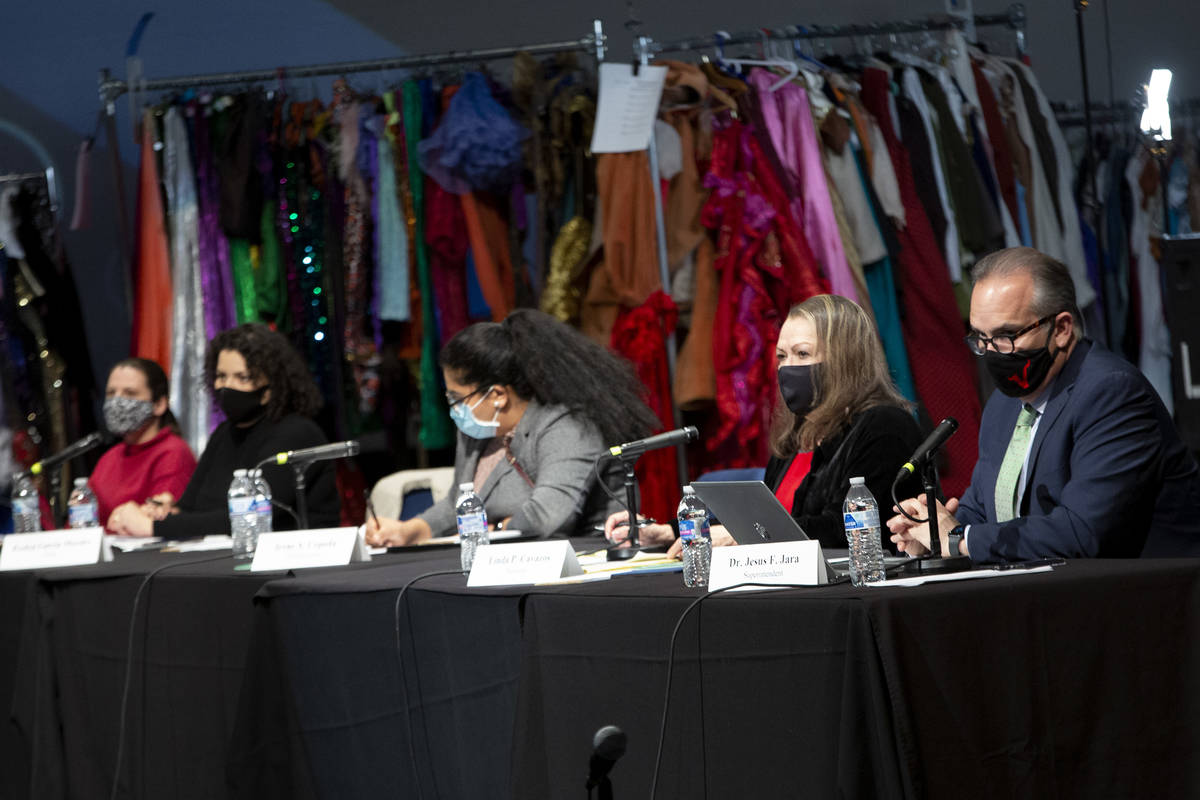Jara, CCSD board receive low marks in The Nevada Poll
A plurality of probable Nevada voters is dissatisfied with the way the Clark County School District trustees and Superintendent Jesus Jara have handled the coronavirus pandemic, while a majority say the district’s distance learning model is broken, according to poll results published Wednesday.
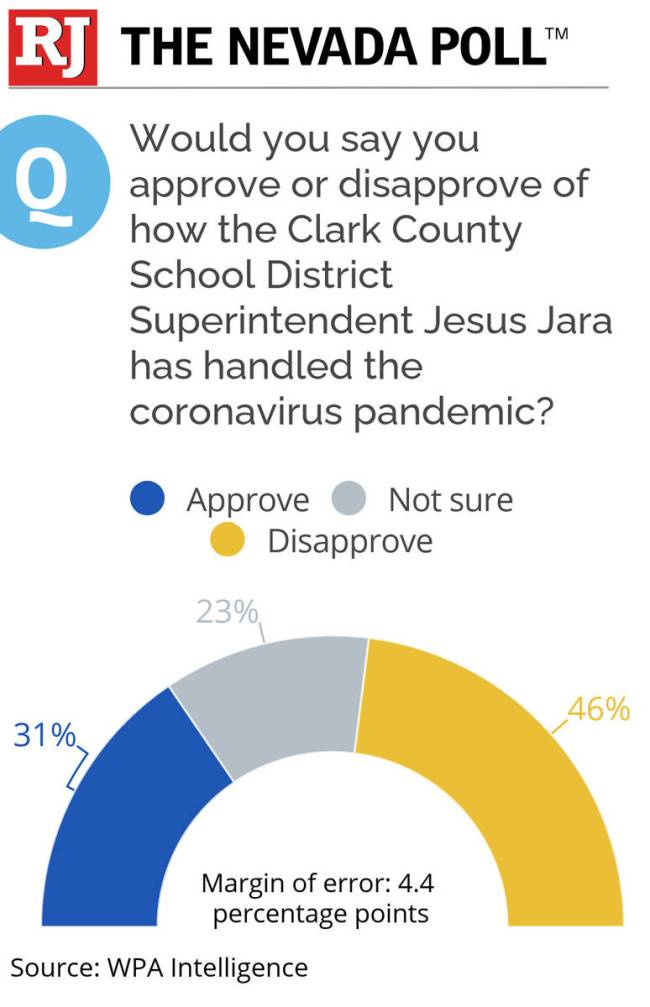
The Nevada Poll, a phone and online survey of 500 likely voters by the national public opinion firm WPA Intelligence on behalf of the Review-Journal from Friday through Monday, produced markedly similar findings when respondents were asked to evaluate how the School Board and Jara have handled the COVID-19 pandemic.
Forty-six percent said they disapproved of actions taken by both the trustees and the superintendent, while 32 percent expressed approval of the School Board’s performance and 31 percent supported Jara’s moves.
In contrast, the poll showed a majority of respondents — 53 percent — approved of Gov. Steve Sisolak’s handling of the pandemic.
The poll, which has a margin of error of plus or minus 4.4 percentage points, did not ask about the reasons for respondents’ dissatisfaction. But both the board and Jara have come under fire recently over their plan for a phased reopening of schools, which began with the return of pre-kindergarten through third-grade students on Monday. The flak has come at them from both sides: those who say they are moving too slowly toward a full reopening and those opposed to a full-time return.
School Board’s president understands the anger
Board President Linda Cavazos said Thursday that she doesn’t blame people for being upset.
“I would say that I can understand where some of those low ratings are coming from because I feel that we could have done a better job,” she said, adding that she was not speaking on behalf of her colleagues.
Cavazos, who took over as board president in January, cited timely, clear and consistent messaging as an area for improvement, saying, “I think we have a huge amount of growth to look at in that category.”
Cavazos also said she’s happy about resuming limited in-person attendance during board meetings and about the new option for people to leave a recorded voice message that’s played during the public comment period.
A statement from the school district to the Review-Journal noted that the number of people who took the survey was small compared with its approximately 310,000 students and 40,000 employees. It also remarked on “the success of how hybrid instruction has gone this first week.”
“The Clark County School District is focused on returning all students to face-to-face instruction and is proud to give families the option of continuing full-time distance education if they choose,” it said. “We are dealing with a global pandemic. Our priority is the safety and wellbeing of students and staff.”
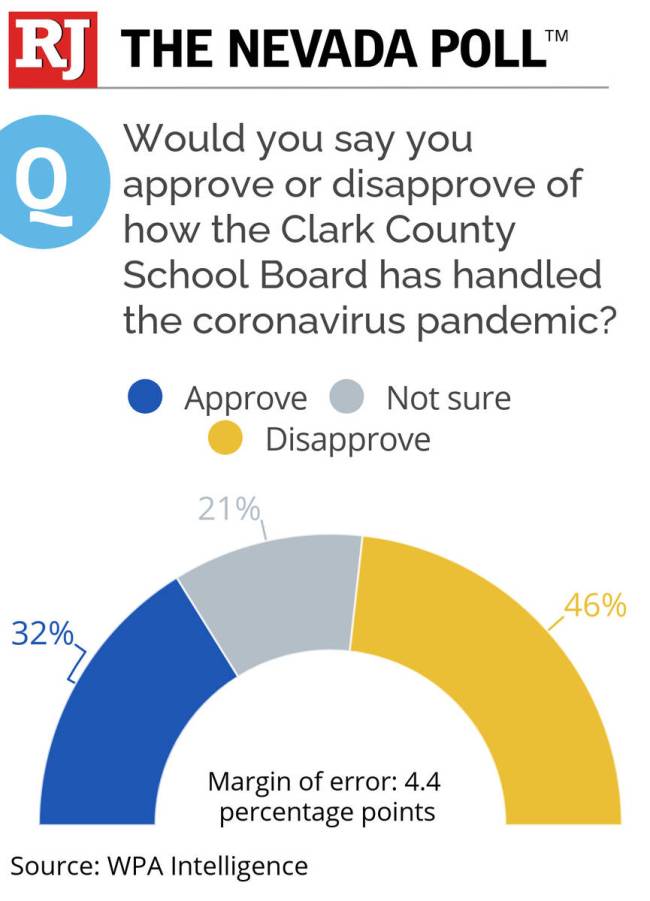
Sisolak issued the emergency directive on March 15 that closed all public and private schools as COVID-19 began to spread rapidly in the state. He also issued other directives spelling out social distancing and capacity requirements that schools must abide by, measures that made it harder for the massive Clark County school system — the fifth-largest in the nation — to consider a quicker path toward reopening.
But when the governor began easing restrictions on schools in the summer, decisions on the timing for resumption of in-person instruction were left to local officials. That shifted the public’s attention away from the state’s role, said Bradley Marianno, an assistant professor at UNLV who has a doctoral degree in urban education policy.
School boards are comprised of people who weren’t necessarily pandemic experts when they were elected, and they were all of a sudden tasked with making reopening decisions during a once-in-a-lifetime pandemic, he said.
“Those are difficult governance decisions to be made,” he added.
Marianno, who has studied school closures nationwide during the pandemic, also said the timing of the poll matters in the results, noting that Sisolak played a much larger role in spring 2020 in statewide school closures and reopenings.
He added that he would be interested in seeing a more detailed breakdown of responses across party lines.
“What’s predictive of reopening decisions around the country has little to do with COVID-19 rate at all,” he said, adding that the political leanings of local voters, the strength of the teachers’ union and demographics of a school district all are key factors.
In Clark County, Republicans were more likely to take a dim view of the School Board’s handling of the pandemic, with 66 percent expressing disapproval vs. 58 percent of independents and 25 percent of Democrats.
Younger respondents were more disapproving than their elders of the board’s performance, with 52 percent of 18- to 34-year-olds taking issue with its actions.
The breakdown by political party and age was similar for a question about how Jara handled the pandemic.
Evenly split on Jara’s job
Respondents who had an opinion were almost evenly divided on whether Jara, who has been superintendent since 2018, should retain his job or be replaced after his current contract ends on June 30.
Of those surveyed, 29 percent were in support of keeping Jara on the job, while 28 percent wanted to replace him. But the largest group — 43 percent — either said they didn’t know or didn’t answer the question.
Jara did not respond to a request for comment.
Other key findings in the polling include the 53 percent of respondents who said distance learning is broken versus 26 percent who said it isn’t; the 47 percent who said the school district’s reopening plan is insufficient versus 34 percent who say it is; and the 46 percent who said all schools should reopen to all grade levels immediately, a move opposed by 40 percent of respondents, said Trevor Smith, research director for WPA Intelligence.
The planned resumption of school sports also remain a point of contention, the poll shows.
Thirty-five percent of those surveyed said the school district’s current plan is sufficient, while 49 percent disagreed. Interscholastic competition for fall sports remain canceled this school year, but spring sports will be offered.
Of those surveyed, 38 percent said high school sports shouldn’t return until August at the soonest, while 39 percent favored bringing back all high school sports immediately, a move opposed by 46 percent.
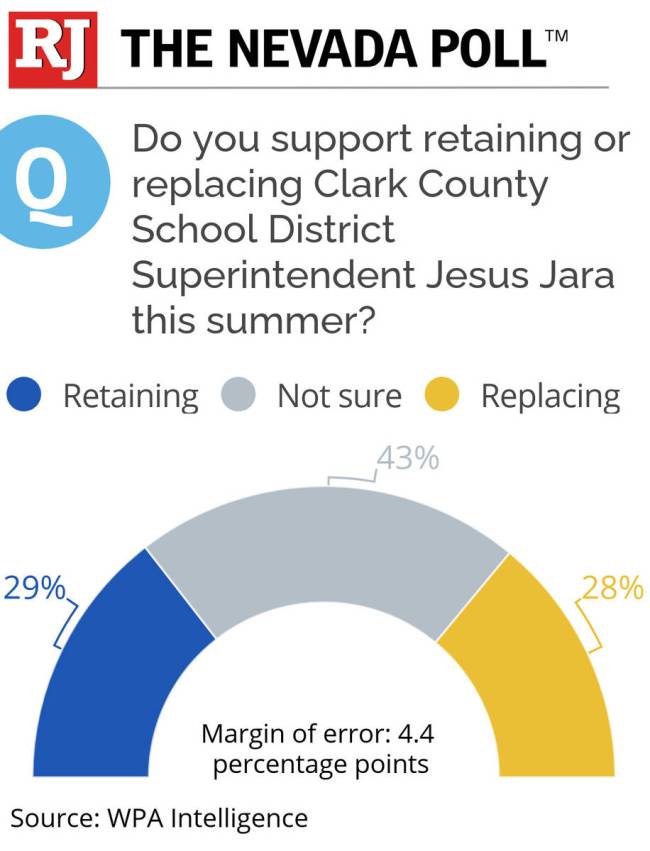
The school district operated under 100 percent distance education for nearly a year before beginning to reopen to in-person instruction this week for preschool through third graders under a hybrid model, with two days a week of in-person classes and three days of distance learning.
55 percent comfortable sending kids to schools
As of Monday, 41,520 preschool through third grade students were participating in the hybrid model — about 45 percent of those eligible. The rest are opting to continue with full distance education.
That percentage was well below the 55 percent of poll respondents who indicated they were either very comfortable or somewhat comfortable sending kids back to school.
The school district plans to have full-time in-person classes starting April 6 for all elementary school grades. And older students will come back to buildings in two phases starting March 22 under a hybrid model.
As for the possibility that the trustees or Jara may face consequences for their handling of the COVID-19 crisis, the heat is usually more intense for those those closest to the end users — parents and their children, said Kenneth Retzl, director of education policy for the nonprofit Guinn Center.
Public backlash tends to be directed to those “closest to where the families or parents interact with the school system,” such as the superintendent and local elected officials, rather than those at the state level, said Retzl, who commented before The Nevada Poll results were released.
Contact Julie Wootton-Greener at jgreener@reviewjournal.comor 702-387-2921. Follow @julieswootton on Twitter.
The crosstabs attached to a previous version of this story had a typographical error in the age breakdown of poll participants. The error has been corrected in the current crosstabs.



